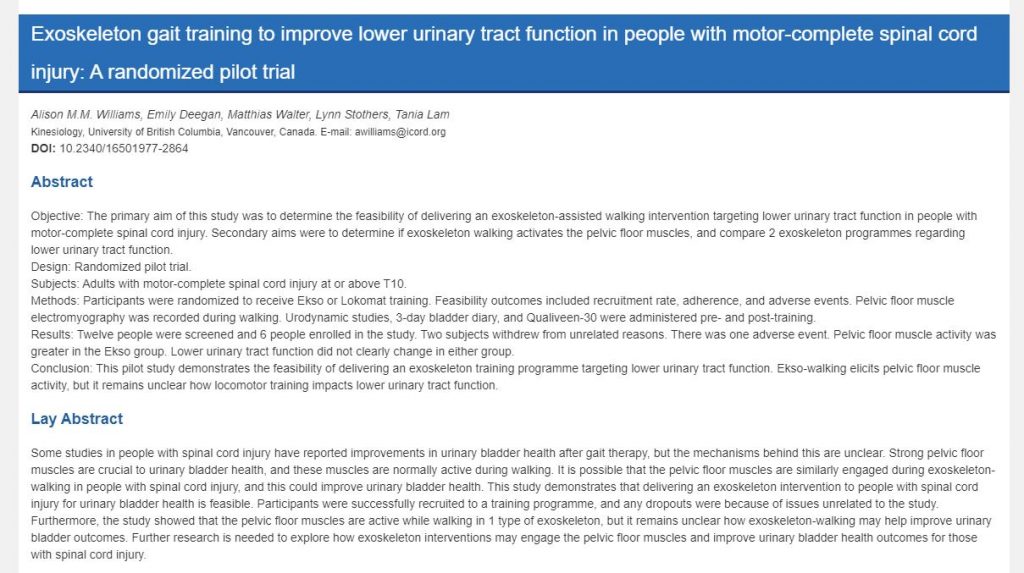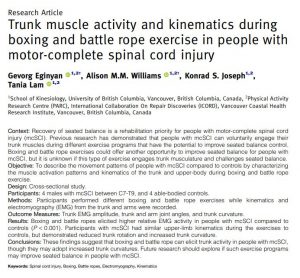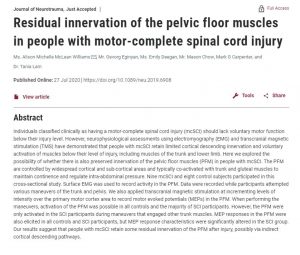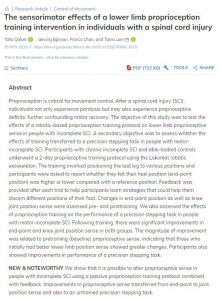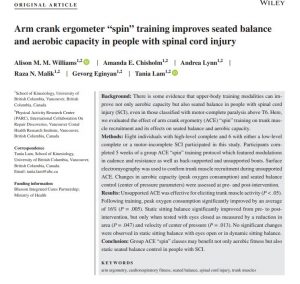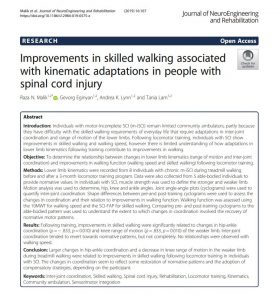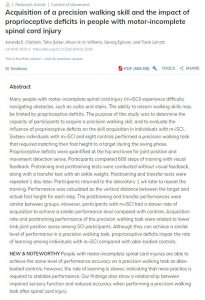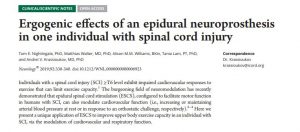Former undergraduate student and now lab staff member, Maya, recently published an article on the knowledge, attitudes, and practices related to pelvic floor muscle training among people with spinal cord injury. This survey included people with SCI from across North America and revealed that that while people with SCI are interested in this type of therapy, very few people have tried pelvic floor muscle training. Read the full article here!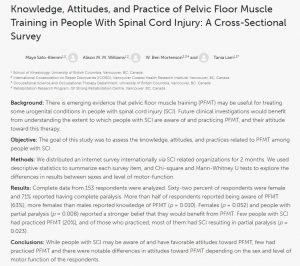
Category Archives: publications
Exploring pelvic floor muscle activity during gait
Our recent publication explores how the pelvic floor muscles are active during walking and jogging in able-bodied men and women. This is the first paper to characterize pelvic floor muscle activity during the entire gait cycle and hints at how these muscles work during physical activity to prevent incontinence. Check out the full paper here.
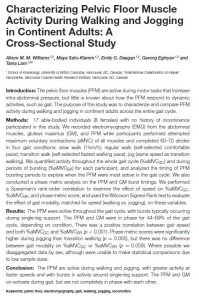 Special thanks to everyone who participated in this study!
Special thanks to everyone who participated in this study!
Can we use exoskeleton-assisted walking to improve urogenital outcomes?
Check out our recent publication on the effects of exoskeleton-assisted walking to improve urogenital outcomes, such as urinary incontinence, for people with spinal cord injury. Preliminary data from this paper was first presented by Dr. Lam at the 2019 International Continence Society in Sweden, and we are excited to publish the final results! Read the full paper here.
New publication on seated boxing for spinal cord injury
Our Master’s student, Gevorg, and Lab Manager, Ali, published an article about the effects of seated boxing and battle rope exercises on trunk muscle activity for people with motor-complete spinal cord injury. This paper adds to the growing body of literature that people with high-thoracic and cervical motor-complete injuries have some degree of voluntary muscle activation in their abdominal and lower back muscles. Read the whole publication here.
This work was a part of Konrad’s undergraduate directed studies project. Way to go team!
New Paper on Residual Pelvic Floor Muscle Innervation in Motor-Complete SCI
Last week, we received notice that Alison’s Master’s work has been accepted for publication in the Journal of Neurotrauma. Alison’s study explored the extent of residual innervation of the pelvic floor muscles in people with motor-complete spinal cord injury (mcSCI). She found that people with mcSCI retain some residual innervation to this muscle group, but possibly via indirect cortical pathways. To read more, click here!
Congratulations to authors Alison Williams, Gevorg Eginyan, Emily Deegan, Mason Chow, Dr. Mark Carpenter, and Dr. Tania Lam.
New Publication on Proprioception Training after SCI
Previous student Taha Qaiser published the findings of his Masters in November 2019 which described the use of passive proprioceptive training for individuals with an incomplete SCI. Proprioceptive training resulted in significant improvements in end point and knee joint position sense. Click to read more!
Congratulations to authors Taha Qaiser, Gevorg Eginyan, Franco Chan and Dr. Tania Lam.
New Paper on Arm-Cycle “Spin” Training for Balance in SCI
In October 2019, Alison published our research on arm crank ergometer (ACE) “spin” training in the Scandinavian Journal of Medicine and Science in Sports. We found that ACE training not only improved aerobic capacity, but also static seated balance in individuals with SCI. To learn more, read the article here.
Congratulations to authors Alison Williams, Dr. Amanda Chisholm, Andrea Lynn, Raza Malik, Gevorg Eginyan, and Dr. Tania Lam.
New Paper on Kinematic Adaptions and Skilled Walking in SCI
In August 2019, Raza published his work investigating how locomotor training can be used to elicit kinematic adaptations that improve walking in individuals with motor-incomplete SCI. These results suggest that improvements in skilled walking had a significant relationship to changes in knee range of motion and hip ankle coordination of the weaker limb. Click here for the full article.
Congratulations to authors Raza Malik, Gevorg Eginyan, Andrea Lynn, and Dr. Tania Lam.
New paper on Acquisition and Retention of Skilled Walking in SCI
In March 2019, previous postdoctoral fellow Dr. Amanda Chisholm published her study investigating the proprioceptive deficits of individuals with motor-incomplete SCI and how this impacted the learning of a precision walking skill. Compared to able-bodied controls, individuals with motor-incomplete SCI were able to achieve the same level of performance accuracy, although more practice was required to learn the skill. Check out the publication to learn more.
Congratulations to authors Dr. Amanda Chishlom, Taha Qaiser, Alison Williams, Gevorg Eginyan, and Dr. Tania Lam.
The Latest from our Epidural Stimulation Collaboration
Over the past two years, we have had the pleasure of collaborating with Dr. Andrei Krassioukov’s laboratory to investigate the effects of epidural stimulation on autonomic function. Our first case report (2018) demonstrated that epidural spinal cord stimulation may be help manage cardiovascular dysfunction in individuals with chronic SCI. Click here to learn more.
In our second study (2019), we demonstrated how epidural stimulation can improve upper body exercise capacity via the modulation of cardiovascular and respiratory function. The full study can be found here.
Thank you to the many authors and contributors of these two publications, from our lab as well as others. We are very excited to continue our collaboration with Dr. Krassioukov’s group – look out for more papers from our labs in the future!
